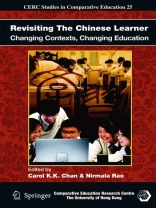It is seventeen years since I first formulated ‘The paradox of the Chinese learner’ in a conference in Kathmandu, Nepal. My original formulation of the paradox was that westerners saw Chinese students as rote learning massive amounts of information in fierce exam-dominated classrooms – yet in international comparisons, students in the Confucian heritage cla- rooms greatly outperformed western students learning in ‘progressive’ western classrooms. This seeming paradox raised all sorts of questions to which many others have contributed important answers, especially that by Ference Marton on how Chinese learners construed the roles of memory and understanding in ways that were foreign to typical western educators. Much of this work was brought together in The Chinese Learner (1996), edited by David Watkins and myself. That work raised more questions still, especially about educational contexts, beliefs and practices, which were investigated in contributions to Teaching the Chinese Learner (2001). And now we have Revisiting the Chinese Learner, which is a very timely collection of excellent contributions that take into account the many changes that have taken place since 2001, changes such as: 1. The globalisation of education especially through educational technology, and enormous socio-economic changes, especially in China itself. 2. Changes in educational policy, aims, curriculum and organi- tion, and decentralisation of educational decision-making in many Confucian heritage cultures. 3.
Mục lục
Moving Beyond Paradoxes: Understanding Chinese Learners and Their Teachers.- STUDENT BELIEFS AND APPROACHES TO LEARNING.- Learning to Self-Perfect: Chinese Beliefs about Learning.- Motivation and Competition in Hong Kong Secondary Schools: The Students#x2019; Perspective.- New Experiences, New Epistemology, and the Pressures of Change: The Chinese Learner in Transition.- TEACHER BELIEFS, CHANGING PEDAGOGY AND TEACHER LEARNING.- The Chinese Learner of Tomorrow.- Classroom Innovation for the Chinese Learner: Transcending Dichotomies and Transforming Pedagogy.- Teaching Mathematics: Observations from Urban and Rural Schools in Mainland China.- Teaching English to Chinese-Speaking Children.- Preschool Pedagogy: A Fusion of Traditional Chinese Beliefs and Contemporary Notions of Appropriate Practice.- In Search of a Third Space: Teacher Development in Mainland China.- CONCLUSION.- The Paradoxes Revisited: The Chinese Learner in Changing Educational Contexts.












